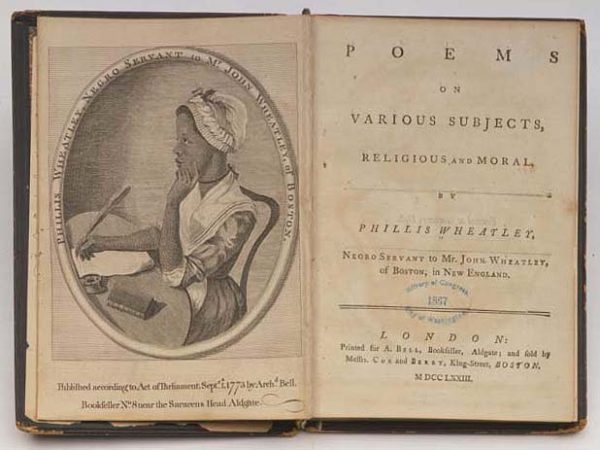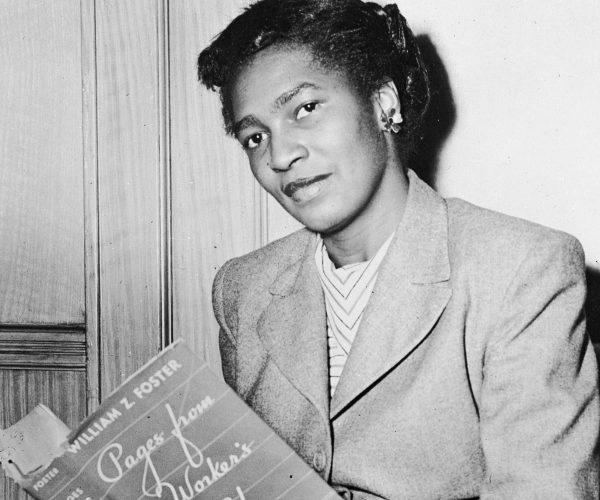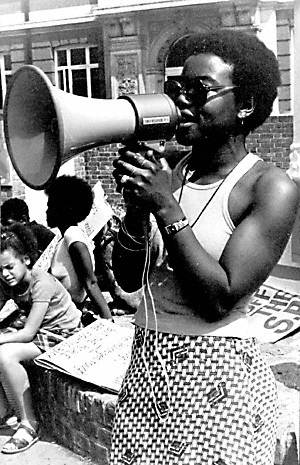I hear stories, I see images, I read statistics, I consume art, I learn. I learn names of women doing prodigious things that I have never known. Throughout my adulthood I have found myself frequently asking, “why did I never know this?”. Why was I deprived of this knowledge? How could I never know that the first female self-made millionaire was a black woman who earned her fortune developing black hair care until only a few years ago? I am aware we wouldn’t spend each day thanking every person for every invention, remembering every person that came before us in every avenue of life, that’s intense. However I can’t help but ruminate over the days I was made to feel alien because of my curly hair (or very much frizzy at the time) as a teen, in a predominantly white secondary school, having a teacher threaten a uniform report on my natural curls citing it as an extreme hairstyle. The next morning as I dolloped a large amount of of pink or dark and lovely (if you know, you know) in the palm of my hand and ran my fingers through my hair attempting to tame it in the hopes of steering away another similar public disagreement, with not another brown face present to shoot me a knowing nod in relation and support. I wonder, had I possessed the knowledge of this self-made millionaire whether my mind would have floated to Madam C. J. Walker with thanks and I would have walked a little taller, left my hair a little bigger knowing this hair was the catalyst for an idea that brought in a fortune, before I was even an idea in this world, my hair was history, history that had been hidden away for far too long
Throughout history too many women have been overlooked, too many black women have been expelled from our lessons. Over the past month we at Freebird have released our first three instalments of our ongoing feature “to all the black women I never knew…” we aim to shine a light on the names that have been concealed from our vision. We directed the torch on Phillis Wheatley, Claudia Jones and Olive Morris, but come on, the depth of these dynamic women’s stories cannot be crammed into an instagram square. Though still just a snapshot view of their multifaceted lives, Wheatley, Jones and Morris deserve the brightness directed their way, so we at Freebird urge you to indulge in their stories and dare you to share them, think ‘pay it forward’, intersectional feminist style.
Phillis Wheatley (1753-1784)
The first African American woman to publish a book.
As a poet myself, Phillis Wheatley is dear to my heart. Born in West Africa, Phillis Wheatley was kidnapped in 1761 by slave traders and at just under 8 years old was forced to America on a slave ship called ‘Phillis’, that she would later be named after. Surviving this transatlantic journey alone was a feat, it killed nearly a quarter of the passengers. She was ‘bought’ by John Wheatley as a ‘gift’ for his wife Susanna, as a personal servant and in his mind a ‘companion’, taken to their home in Boston and named against her will. When John and Susanna noticed her brainpower, after finding her writing with chalk on a wall, they began teaching her. Her innate talent, along with her studious attitude empowered her to become fluent in English in under two years. Alongside learning English, Greek and Latin, she studied a myriad of subjects mainly surrounding the humanities.
Her enthusiasm for writing came from within, the tender age of 13 brought her first published poem ,“On Messrs. Hussey and Coffin” in the Newport Mercury newspaper. From here she travelled to London in 1773 to publish her book “Poems on Various Subjects Religious and Moral”, a collection of 39 poems. The works were published here in the UK as the publishing industry was more established here than over the pond. She was the first African American woman to have a book published, and the works were captivating; consequently scepticism was rife with the questioning of Wheatley’s authorship. Rightly anticipating this may happen, Phillis and the Wheatley’s recruited eighteen of the most notable and respected New England religious and political leaders to sign a document, verifying her as the author. They were well aware this was a political statement and were awaiting the controversy, Phillis’ story was extraordinarily different to many other African people who were dehumanized and enslaved, as she had the opportunity to explore her talent and intelligence. Her works’ popularity across the United States and United Kingdom eventually earned her freedom and she went on to be a pivotal supporter of the colony’s independence during the Revolutionary war. Wheatley was a creative and an intellect, we at freebird urge for an equal representation of genders across the creative industries. The patriarchy wants us to believe that women as serious creatives is something that is new, yet we have been here, letting our thoughts pour onto paper the whole time. Fighting for equal representation in all avenues in 2020 seems ludicrous when Phillis Wheatley was out here representing in the 1700’s. Thank you Phillis.
“In every human Breast, God has implanted a Principle which we call Love of Freedom; it is impatient of Oppression and Pants for deliverance”- Phillis Wheatley
Claudia Jones (1915-1964)
Political Activist and founder of the Caribbean Carnival (precursor to Notting Hill Carnival)
This year, every annual carnival goers heart was broken (me included), with the confirmation of what we already knew, Notting Hill Carnival was cancelled, for the first time since it’s beginning due to uninvited, ill-mannered Miss Rona. With a Carnival shaped hole in my heart, it feels more important than ever for us to know, understand and celebrate the woman that created a space that allowed carnival to develop into the euphoric honey pot, attacking the senses in all the right ways that it is today.
Trinidad born Claudia Jones, moved to Harlem, New York aged eight with her family, in an attempt to find a better quality of life. They were met with prejudice and discrimination and so her parents struggled to find long term work, leaving them with poor living conditions and consequently, health. Claudia was diagnosed with Tuberculosis, and her mother died prematurely at 37, which she noted as her first major realisation that the mistreatment of black people was costing their lives. Jones is the covergirl of working your way to the top and giving a voice to your community, starting at a local newspaper, landing a position on the communist party’s editorial staff and eventually became the editor of Negro Affairs. Jones advocated for the rights and mobilisation of black women long before Kimberle Crenshaw coined the term ‘intersectionality’. (Watch Kimberle Crenshaw’s TED talk on the urgency of intersectionality, thank us later**). Forms of discrimination are not isolated, they befriend and work together at the crossroads of oppression. Her most famous piece ‘An End to the Neglect of the Problems of the Negro Woman’ screams intersectional feminism, loud and clear.
It’s the mid 50’s and Senator Joseph Mccarthy is leading a pro-conmunism witch hunt, and Jones being a key face of the Conmunist party, is charged with ‘un-american activities’ (she wasn’t even american). She was deported, bypassed by her home, Trinidad, and sent to London, unaware of the mark she would make. Her deportation coincided with the windrush generation – she had a community to join and build. She founded England’s first major Caribbean newspaper the ‘West Indian Gazette’, her office located above a small record shop in Brixton, she was the beat in the heart of the culture, wherever she went.
What you’ve all been waiting for… Notting Hill Carnival. The Notting Hill race riots took place over august bank holiday weekend 1958. Racist English defence leagues were growing, inciting violence on black communities. 5 days that left people injured, dead and those surviving, distraught. Jones knowing she had to act for the community, picked celebration over mourning, it was time to honour their heritage and the community – showcase, feel, and bask in all its power and glory. Did you know the Caribbean has more than 700 islands? The culture of our people is vast, with colourful sounds, dance, food and drink in abundance. The Caribbean Carnival celebrates that, inviting others to entangle themselves in the sounds and glimpse into the West Indies. First held indoors at St Pancras Town Hall (I KNOW!!), the precursor to the Notting Hill carnival we know today now has over 2.5 million attendees. Claudia died only 5 years later, at only 49! She achieved what many could only dream of in a lightning amount of time. Carnival, ‘til we meet again.
“A people’s art is the genesis of their freedoms” – Claudia Jones
Olive Morris (1952 – 1979)
Political Activist and British Black Panther Party Member.
When Claudia Jones passed, Olive Morris would have been 12 years old. As I write this piece, I find myself imagining a spring afternoon outside a Brixton record store and a conversation between Olive Morris and Claudia Jones, had they crossed paths. The things they would talk about and movements they could make, if only Jones lived a little longer, south London’s overlooked icons of their own time.
Olive Morris moved from Jamaica to South London aged 9, as part of the Windrush Generation. For many political activists there is a pivotal moment remembered, that is the impetus for a life of considered action. For many young people today, it will be the normalisation of the countless lifeless black bodies painted across the TL, it will be 8.46, the number that was given meaning on May 25th 2020, it will be the name Breonna Taylor that appears every time they close their eyes. For Olive Morris the catalyst was the 15th November 1969. Not a headline in the news, but a firsthand experience that would solidify her path. Nigerian diplomat Clement Gomwalk parked his Mercedes near Desmond’s Hip City, a Brixton record store. The police accused him of stealing the car. (Let’s talk about the “sus” law, in which the police were empowered to stop anyone they suspected of wrongdoing. This law was used and abused as a tool to keep black people down. It was hard to prove ill-use. Many organisations wrote reports that demanded revising of the law and it was finally repealed in 1981. Yet, as many systemic forms of racism do, it has just been given a new framework, the official figures for england and wales show black people are nine times more likely to be stopped and searched by police than white people, as per 2019-2020.) Gomwalk naturally objected to his arrest (this is where accounts vary), and the police became forceful, 17 year old, 5 foot 2 Morris interfered, confronting the police on their treatment of the diplomat, which riled them even more and the aggression turned towards her. She stated “each time I tried to talk or raise my head I was slapped in the face”. When in custody, she was threatened with rape, forced to undress while police watched to prove her womanhood and brutally beaten. She was fined, given a suspended sentence and released.
At this point she was already a part of the British Black Panther Movement youth group and similar to Claudia Jones, she was thrust into the world of intersectional politics and became an integral mobilizer of black women socially and politically in the 1970’s. She set the first networks for women, both black and asian with her two organisations; the Brixton Black Womens Group and the Organisation of Women of African and Asian Descent (OWAAD), a physical space for women to have their voice heard for the first time. Whilst studying in Manchester between ‘75 and ‘78, her activism didn’t take a backseat, she took it with her north setting up the Manchester Black Womens Co-operative.
Whilst her activism was broad she had a particular fixation on, housing/squatting and black women and children. In 1972, two black children died in a fire after their portable heaters were knocked over. Morris led a demonstration for more secure heating in public housing outside the local government offices, which resulted in central heating being installed. She squatted in 121 Railton Road in Brixton and created a space for community groups to meet, it also housed the Sabarr bookshop, one of the black communities first. She died of Non-hodgkin’s Lymphoma in 1979. She was 27. All her activism was carried out in just one decade, in the UK and across the world.
“She represents the kind of Black women who, over the years, have thrown themselves into the struggle of this country and made an indelible, if anonymous, mark” this quote about Olive Morris from “Heart of the Race: Black Women’s Lives in Britain” rings true for Wheatley, Jones and Morris, and many more black women who have been overlooked. The history of black people is rich, overflowing, and is so incredibly varied. We, as black people, are multifaceted leading incredible and extraordinary lives. We are itching to learn, we are itching to share, we are itching to teach, and we can’t wait till all the black women we never knew, becomes all the black women we adore that we know.
(Keep an eye out for my poem “To all the black women I never knew…”, which will be featured on FreeBird in the coming weeks)
Yasmin Dawes
Further learning: **Kimberle Crenshaw – TED Talk – The Ugency of Intersectionality https://www.youtube.com/watch?v=akOe5-UsQ2o




Recent Comments